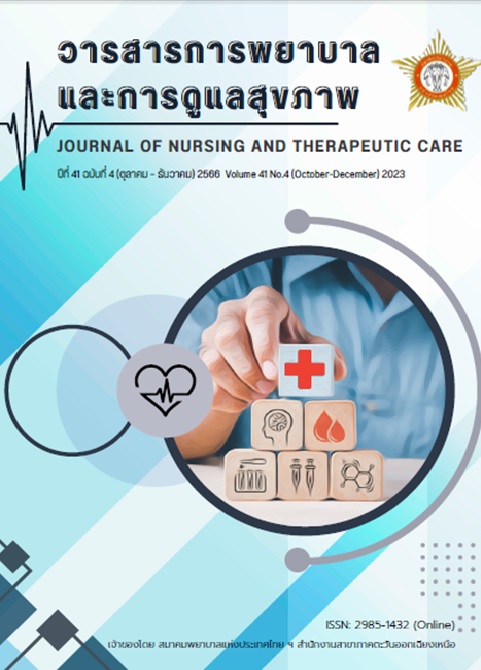การพัฒนาโปรแกรมการลดน้ำหนักโดยใช้แนวคิดการจัดการตนเอง สำหรับผู้ที่เป็นความดันโลหิตสูงที่ควบคุมความดันโลหิตไม่ได้และมีโรคอ้วน
คำสำคัญ:
โปรแกรมการจัดการตนเอง, โรคความดันโลหิตสูง , การลดน้ำหนัก , โรคอ้วนบทคัดย่อ
โรคอ้วนสัมพันธ์กับการกระตุ้นทั้งระบบประสาทซิมพาเธทิคและเรนินแองจิโอเทนซินแอลโดสเตอโรน ส่งผลให้เกิดความดันโลหิตสูง การลดน้ำหนักตัวในผู้ป่วยความดันโลหิตสูงที่มีโรคอ้วนจึงเป็นคำแนะนำในแนวทางการรักษาตามมาตรฐาน อย่างไรก็ตามการปรับพฤติกรรมเพื่อลดน้ำหนักตัวเป็นสิ่งที่ท้าทาย เนื่องจากต้องการทักษะเฉพาะในการจัดการและติดตามตนเองเพื่อความต่อเนื่องของพฤติกรรม การจัดการตนเองเป็นแนวคิดที่มีการนำมาประยุกต์ใช้อย่างแพร่หลายเพื่อปรับพฤติกรรมในผู้ป่วยเรื้อรัง ผู้วิจัยจึงพัฒนาโปรแกรมการลดน้ำหนัก โดยใช้แนวคิดการจัดการตนเองสำหรับผู้ป่วยความดันโลหิตสูงที่ควบคุมระดับความดันโลหิตไม่ได้และมีโรคอ้วน โปรแกรมการลดน้ำหนัก 12 สัปดาห์ที่พัฒนาขึ้น ประกอบด้วยทักษะการจัดการตนเอง 4 ด้าน คือ 1) การเฝ้าระวังตนเองเกี่ยวกับพฤติกรรมการรับประทานอาหารและการออกกำลังกาย โดยใช้การบันทึกอาหาร การเดินนับก้าว ควบคู่กับบันทึกน้ำหนักตัวที่เปลี่ยนแปลง 2) การฝึกทักษะเฉพาะด้านการคำนวณพลังงานที่ได้จากอาหาร และคำนวณการออกกำลังกายที่เหมาะสม 3) การเสาะแสวงหาข้อมูลเพื่อนำมาจัดการตนเองในการลดน้ำหนัก โดยมีช่องทางการสื่อสารให้ข้อมูลกับบุคลากรสุขภาพ และ 4) การปรับเปลี่ยนพฤติกรรมเลือกบริโภคอาหารและเดินนับก้าวตามเป้าหมายเพื่อลดน้ำหนัก จากนั้นนำโปรแกรมลดน้ำหนักที่พัฒนาขึ้นไปทดลองใช้กับกรณีศึกษา จำนวน 1 ราย
ผลจากการนำไปใช้พบว่า กรณีศึกษา ชายไทย อายุ 57 ปี ระดับความดันโลหิตเฉลี่ย 160/73 มิลลิเมตรปรอท ดัชนีมวลกาย 31 กิโลกรัม/เมตร2 สามารถจัดการตนเองเพื่อลดน้ำหนักได้ พฤติกรรมการรับประทานอาหารเปลี่ยนแปลง สามารถเดินได้ตามเป้าหมาย และมีน้ำหนักตัวและระดับความดันโลหิตลดลง อย่างไรก็ตามโปรแกรมดังกล่าวควรได้รับการทดสอบประสิทธิผลในการวิจัยก่อนนำไปใช้
Downloads
เอกสารอ้างอิง
Thai Hypertension Society. 2019 Thai Guidelines on The Treatment of Hypertension. Chiang Mai Province: Trickink; 2022. (in Thai)
Unger T, Borghi C, Charchar F, Khan NA, Poulter NR, Prabhakaran D, et al. 2020 International Society of Hypertension Global Hypertension Practice Guidelines. Hypertension. 2020;75(6):1334-57.
Division of Non Communicable Disease. Situation on NCDs prevention and control in Thailand. Nonthaburi: Department of Disease Control Ministry of Public Health, Thailand; 2018. (in Thai)
Fuchs FD, Whelton PK. High blood pressure and cardiovascular disease. Hypertension. 2020;75(2):285-92.
Panthonglang W, Namphonkrang P, Duangsanjan W. Factors influencing the health behavior of uncontrolled hypertension patients. Songklanagarind Journal of Nursing. 2018;38(4):152-65. (in Thai)
Onsrinoi N, Leelukkanaveera Y, Toonsiri C. Predictive factors of hypertension preventive behaviors among people with pre-hypertension. Songklanagarind Journal of Nursing. 2017;37(1):63-74. (in Thai)
Tantiekkarat S, Makmee P, Suksanguam N, Sattaphan N. Factors associated with self-care behaviors of the elderly with hypertension in Buriram province by using the precede framework theory. VRU Research and Development Journal Science and Technology. 2020;15(1):59-73. (in Thai)
Critical Hypertension Clinic Srinakarin Hospital. HT clinic patient statistics recording program. Khon Kaen: Srinakarin Hospital, Khon Kaen University; 2020. (in Thai)
Rodkaew S, Nontapet O, Petsirasan R. The relationship between body mass index and cardiovascular disease risks in hypertensive patients. Thai Journal of Cardio-Thoracic Nursing. 2021;32(2):120-30. (in Thai)
Hall ME, Cohen JB, Ard JD, Egan BM, Hall JE, Lavie CJ, et al. Weight-loss strategies for prevention and treatment of hypertension: A scientific statement from the AHA. Hypertension. 2021;78(5):e38-e50.
Shariq OA, McKenzie TJ. Obesity-related hypertension: a review of pathophysiology, management, and the role of metabolic surgery. Gland Surg. 2020;9(1):80-93.
Gilardini L, Redaelli G, Croci M, Conti A, Pasqualinotto L, Invitti C. Effect of a modest weight loss in normalizing blood pressure in obese subjects on antihypertensive drugs. Obes Facts. 2016;9(4):251-8.
Maxwell BA. The roles of an evidence-based weight management protocol in hypertension control. San Diego: University of San Diego; 2019.
World Health Organization. Obesity. [Internet]. [cited 2023 Feb 18] Available from: https://www.who.int/health-topics/obesity#tab=tab_1
Thipkratok S, Phatisena T. Effects of self-management program for health behavior modification, body mass Index and waist circumference among village health volunteers with abdominal obesity. Regional Health Promotion Center 9 Journal. 2020;14(34):210–23. (in Thai)
Wanichmontri S, Eiu-Seeyok B. The development and the study of effect of self-management model to reduce obesity in obese nursing students with failed weight-loss experience. Journal of Phrapokklao Nursing College. 2022;33(1):192–210. (in Thai)
Browder DM, Shapiro ES. Applications of self-management to individuals with severe handicaps: A review. Res Pract Persons Severe Disabl. 1985;10(4):200-8.
Methakanjanasak N. Self-management of end stage renal disease patient receiving hemodialysis. Chiang Mai: Chiang Mai University; 2005. (in Thai)
Srisuk P, Methakanjanasak N. Effects of the internet based self-management program for carbohydrate control and exercise promotion among patients with type 2 diabetes. Udonthani Hospital Medical Journal. 2022;30(1):12-23. (in Thai)
He CJ, Fei YP, Zhu CY, Yao M, Qian G, Hu HL, et al. Effects of intermittent compared with continuous energy restriction on blood pressure control in overweight and obese patients with hypertension. Front Cardiovasc Med. 2021;8:750714.
Berge J, Hjelmesaeth J, Hertel JK, Gjevestad E, Småstuen MC, Johnson LK, et al. Effect of aerobic exercise intensity on energy expenditure and weight loss in severe obesity-a randomized controlled trial. Obesity (Silver Spring). 2021;29(2):359-69.
Patterson RE, Sears DD. Metabolic effects of intermittent fasting. Annu Rev Nutr. 2017;37:371-93.
Gouda TMH, Aljuhani HE. The impact of intermittent fasting regimen on hypertension and cardiovascular diseases. J Posit Sch Psychol. 2022;6(8):2192-9.
Bureau of Nutrition, Department of Health: Ministry of Public Health [Internet]. [cited 2023 Feb 18] Available from: https://thaifcd.anamai.moph.go.th/nss/pdf
Guasch‐Ferré, M, Willett WC. The Mediterranean diet and health: A comprehensive overview. J Intern Med. 2021;290(3):549-66.
Keating SE, Johnson NA, Mielke GI, Coombes JS. A systematic review and meta-analysis of interval training versus moderate-intensity continuous training on body adiposity. Obes Rev. 2017;18(8):943-64.
Chatsarin S, Ngwnjairạk R. Effect of physical activity with pedometer promotion program toward cardiovascular fitness outcomes in overweight adults. KKU Journal for Public Health Research. 2019;12(4):40–8. (in Thai)
Yuenyongchaiwat K, Pipatsitipong D, Sangprasert P. Increasing walking steps daily can reduce blood pressure and diabetes in overweight participants. Diabetol Int. 2018;9:75-9.
Onsiri S. Effect of walking with goal setting on body weight, body fat percentage and physical fitness among Kasetsart university female students. Journal of The Royal Thai Army Nurses. 2016;17(1):45-53. (in Thai)
Yu Y, Lv Y, Yao B, Duan L, Zhang X, Xie L, et al. A novel prescription pedometer-assisted walking intervention and weight management for Chinese occupational population. PLoS One 2018;13(1):e0190848.
Chansree N, Nateetanasombat K, Kasiphol T. The effects of self-management program among uncontrolled hypertensive patients. Huachiew Chalermprakiet Science and Technology Journal. 2020;6(2):58-68. (in Thai)
ดาวน์โหลด
เผยแพร่แล้ว
รูปแบบการอ้างอิง
ฉบับ
ประเภทบทความ
สัญญาอนุญาต
ลิขสิทธิ์ (c) 2023 วารสารการพยาบาลและการดูแลสุขภาพ

อนุญาตภายใต้เงื่อนไข Creative Commons Attribution-NonCommercial-NoDerivatives 4.0 International License.



